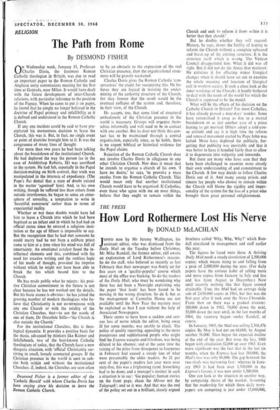The Path from Rome
RELIGION
By DESMOND FISHER
If any one incident could be said to have pre- cipitated his momentous decision to leave the Church, this was it. But, in fact, no single event or point of doctrine brought him to it. It was the congruence of many lines of thought.
For more than two years he had been talking about the breakdown of the institutional Church. He had deplored the way the person (as in the case of Archbishop Roberts, SJ) was sacrificed to the system. He had felt, especially in the Papal decision-making on birth control, that truth was manipulated in the interests of expediency. (The Pope's flat denial that a state of doubt existed in the matter `agonised' him). And, in his own writing, though he suffered less than others from outside interference, he began to sense an atmo- sphere of unreality, a temptation to write in `beautiful constructs' rather than in terms of experiential reality.
Whether or not these doubts would have led him to leave a Church into which he had been baptised as an infant and in which he had had an official status since he entered a religious insti- tution at the age of fifteen is impossible to say. But the recognition that he had met someone he could marry had he not been a celibate priest came to him at a time when his mind was full of uncertainty. An emotional catalyst fused the in- tellectual elements and this, combined with his need for creative writing and the ruthless logic of his mode of thought, provided the impetus without which he might not have been able to break the ties which bound him to the Church.
He has made public what he rejects: his posi- tive Christian commitment in the future is not clear because he has not worked out the details. But his basic stance is obvious: he has joined the growing number of modern theologians who be- lieve that Christianity is not co-terminous with any one Church or with the totality of the Christian Churches, that—to use the words of one of them, Dr Dorothee Solle—`the Church is also outside the Church.'
For the institutional Churches, this is theo- logical dynamite. It provides a positive basis for the thesis, advanced by thinkers like Rattner and Schillebeech, two of the best-known Catholic theologians of today, that the Church faces a new diaspora situation, with `official' Christianity sur- viving in small, loosely connected groups. If the Christian presence in the world is seen to sub- sist both within and without the institutional Churches; if, indeed, the Churches are seen often Desmond Fisher is a former editor of the 'Catholic Herald' with whom Charles Davis has been staying since his decision to leave the Roman Catholic Church. to be an obstacle to the expression of the real Christian presence, then the organisational struc- tures will be gravely weakened.
Charles Davis gives the Roman Catholic 'con- servatives' the credit for recognising this. He be- lieves they are logical in resisting the under- mining of the authority structure of the Church, for they foresee that the result would be the eventual collapse of the system and, therefore, in their view, of the Church.
He accepts, too, that some kind of structural embodiment of the Christian presence in the world is necessary. Groups will organise them- selves informally and will need to be in contact with one another. But he does not think this con- tact has to be maintained through a central organisation, especially since, as he holds, there is no cogent biblical or historical evidence for the Papal claims.
Rejection of the Roman Catholic Church does not involve Charles Davis in allegiance to any other Christian Church. Nor does it mean that he intends to organise a church of his own. 'I have no desire,' he says, `to provoke a mass exodus from the Roman Catholic Church. This would mean only that another institutional Church would have to be organised. If Catholics, even those who agree with me on most things, believe that they ought to remain within the Church and seek to reform it from within it is better that they should.'
But he doubts whether they will succeed. History, he says, shows the futility of hoping to reform the Church without a complete upheaval and break-up of the existing structure. It is the structure itself which is wrong. The Vatican Council disappointed him. What it did was all right. But it did not do the things that mattered. He criticises it for effecting minor liturgical changes when it should have set out to examine the whole meaning and function of liturgical cult in modern society. It took a close look at the inner workings of the Church: it hardly bothered to deal with the needs of the world for which the Church is supposed to be the model.
What will be the effects of his decision on the Catholic Church in Britain? For most Catholics, it has already proved a nine-days' wonder. Some have rationalised it away as due to a mental breakdown or as just another case of a priest leaving to get married. Others adopt a told-you- so attitude and say it is high time the reform and renewal movement started by Pope John was halted. More have deplored the publicity, for- getting that publicity was inevitable and that it was better to have it handled fairly than to allow it to degenerate into vulgarity and innuendo.
But there are many who have seen that they have been challenged to examine more closely their own understanding of and commitment to the Church. A few may decide to follow Charles Davis out of it. And many young priests and sincere lay people who choose to remain within the Church will blame the rigidity and imper- sonality of the system for the loss of a priest who brought them great personal enlightenment.






































 Previous page
Previous page